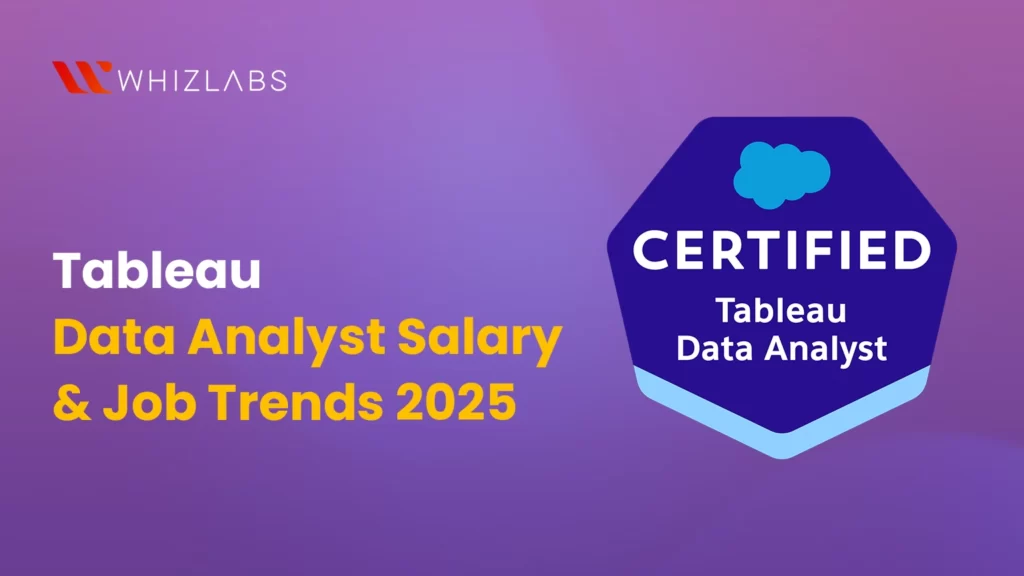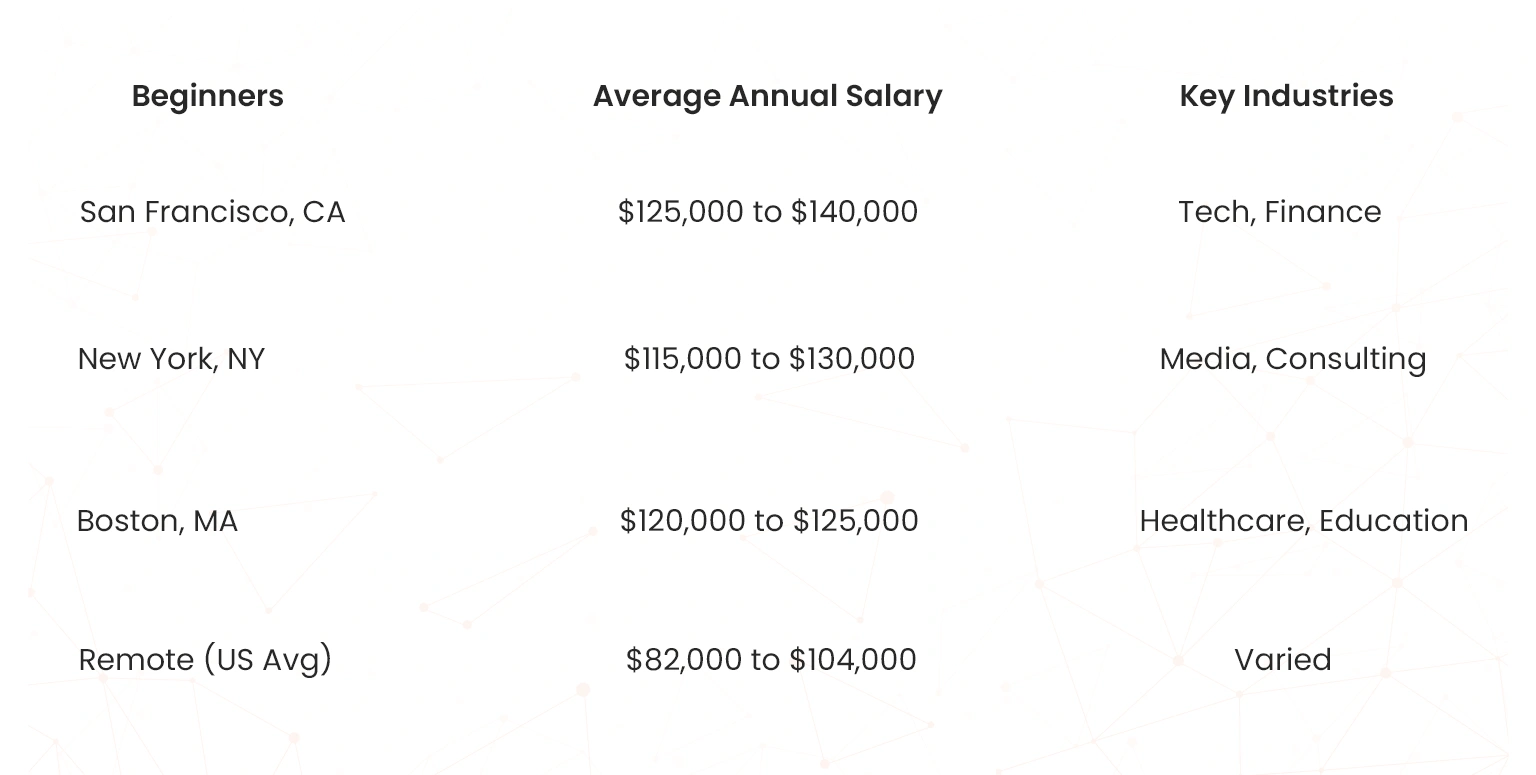In the data-driven world of 2025, Tableau is a powerhouse for converting raw data into actionable insights. Tableau-certified data analysts play a vital part for organizations to validate individual abilities in data analytics and make upfront decisions. This guide presents the salary breakdown of individuals qualified with this certification, career navigation, and industry spotlight to consider and take your next step. Check this now!
The Evolving Role of the Tableau Data Analyst
The role of Tableau data analysts is not merely that of number crunching but that of storytelling and creating well-crafted visual narratives capable of changing decisions in business and life overall in fields like healthcare, finance, retail, and technology. They cope with connecting to different sources of data, building interactive dashboards, and making use of the unique functionalities like Level of Detail calculations that will help to expose hidden patterns daily. The role in 2025 is more about data storytelling, which involves turning complex data sets into simple and actionable data that can be perceived by non-technical stakeholders.
The job market is thriving. The U.S. Bureau of Labor Statistics estimates that the number of data analyst jobs will increase 23% by 2032, which is much higher than the vast majority of professions. Across the globe, there is a chance that 97 million new tech and data jobs may be created by the close of 2025 and negate the issue of job displacement triggered by AI. Tableau-specific jobs, like Business Intelligence Analysts or Data Visualization Developers, will experience 21% growth by 2028, driven by the increased self-service analytics. This is indicated by job postings: 69% of the jobs they post require SQL, statistics, and visualization skills, and 28% of data analyst jobs have Tableau in their description, a 2 percent improvement over 2024. Power BI ranks at 25 percent, yet Tableau has an easier drag-and-drop, so users have an advantage with fast dashboard prototyping.
New positions such as Tableau Enablement Specialist are becoming more common, where non-technical teams are trained on the use of analytics tools. Gartner is forecasting that 90 percent of the analytics consumers will be content creators by 2025 and will exert stress on the analysts to democratize access to data. This change highlights the emergence of the significant role of communication and training skills in addition to technical skills.
Salary Breakdown: What Can You Expect in 2025?
The salaries of Tableau certified data analysts are based on their experience, location and certifications, though the prospects are promising.
Certifications increase the revenues dramatically. An example is the Tableau Certified Data Analyst certification, which raises the compensation from entry-level income to $82,000 and $136,000, and even six months of experience may qualify the candidate. Contractor hourly rates are between 39 and 57, which even freelancers can pay. Bonuses (5-10 percent base salary) and other incentives such as stock options or work-at-home flexibility are considered part of total compensation.
Regional Variations
Location has a great impact on salaries because of differences in cost of living and the needs of the industries. Here’s a snapshot of 2025 averages:
The hubs in the coastal areas and the remote jobs are flexible and have a bit lower salary. Cities such as London (90,000 to 110,000) and Bangalore (30,000 to 50,000) are highly sought after globally, but salaries vary in proportion to the local economy.
Factors Influencing Pay Scale
Experience & Certifications: Tableau Desktop Specialist certification increases base pay by 10-15 percent, and when used with SQL or Python skills, speeds up development.
Industry: Finance and tech industries have 20 percent higher pay than the national average (120000+), and government jobs are at the lowest point (90000).
Skills Stack: Python, R, or AI-driven software, such as the Einstein Analytics section of Tableau, can raise salaries to $150,000 and above. Thirty-one percent of jobs now require both a skill in software and visualization.
Key Skills and Certifications Driving Demand
Tableau data analysts require a combination of soft and technical skills in order to shine. The 2025 job postings have core competencies that include:
Expertise in Visualization: Tableau’s skills in parameters, forecasts, and statistical distributions are highly sought after.
Data Handling: SQL, Excel, and Python are crucial in data extraction and transformation as well as loading processes.
New Trends: AI-enhanced analytics, like Tableau Einstein, are found in 15 percent of advertisements. Cloud services such as AWS, Snowflake, or Azure are becoming more and more in demand, which provides a competitive advantage to the candidates in the enterprise environment.
The certifications are a game-changer. The Tableau Certified Data Analyst exam certifies the ability to problem-solve and deliver insight; even individuals who have half a year of experience can pass the exam. Tableau has official Tracks in prep courses, such as the Analyst Associate or DataCamp, which teach dashboard creation and data modeling. In the case of the enterprise level, Tableau Server Professional is a certification that increases credibility in handling large deployments.
It is important to create a portfolio. To demonstrate practical use, develop mock dashboards based on public data on Kaggle or Tableau Public. There are internships, which are a way to gain some hands-on experience. Soft skills, such as communication with stakeholders and working across functions, are also essential because analysts frequently make reports to executives or to training teams.
Navigating Challenges and Building Your Tableau Career
Despite the fact that in the next two years AI is expected to revolutionize 85 million jobs, it complements and does not negate Tableau analysts. AI tools prove useful in additional data preparation and predictive analytics, whereas human capabilities, including ethical data interpretation, identifying bias, and creating a narrative, are unsubstitutable. Remote positions prevail (70 percent of openings), although hybrid jobs demand the use of collaboration software such as Slack or Microsoft Teams.
The next step is to become a BI Manager (between $130,000 and $180,000), where the responsibilities include junior analyst mentorship and alignment of dashboards to the strategies. The other alternatives are Product Analyst or Data Consultant, where you can utilize Tableau to explore the market or automatize the processes with clients. The environment changes: new functions of Tableau, such as geospatial analytics or in-built AI always evolve, and one should keep learning. Tableau Public is free, and community forums are free.
Networking also pays off. Get to know Tableau User Groups (TUGs) or participate in online conferences such as Tableau Conference 2025 to meet colleagues and employers. LinkedIn states that 60 percent of data analyst recruitment in 2024 will be achieved by referral or networking, which will probably continue.
Industry Spotlight: Where Tableau Analysts Thrive
Some of the industries are investing in Tableau skills:
Healthcare: Salaries are on average $100,000 to $120,000 as healthcare analysts visualize patient outcomes and operational metrics.
Finance: Fraud detection and portfolio analysis are the attractions, with compensation reaching up to $120,000 to $150,000.
Retail/E-commerce: Customer behavior and supply chain dashboards are profitable from $95,000 to $115,000.
Tech: Tech startups and giants such as Google employ Tableau to conduct analytics on products and charge seniors up to $130,000.
The use of Tableau by smaller businesses is on the rise because of its scalability, and analysts have a chance to develop BI systems by themselves and gain employment.
Wrapping Up
As read, the Tableau data analyst job in 2025 is a catapult to an exciting career. Strong employment opportunities, competitive wages (between $82,000 and $172,000), and a structured career ladder make the profession rewarding for individuals who invest in new skills, such as AI implementation, cloud services, and narration. The data explosion does not show any signs of abating, whether you are polishing your first dashboard or heading a BI team. Get lost in the free materials of Tableau, and search websites such as Indeed. The next great thing and opportunity are ahead of you.
- Tableau Data Analyst Salary and Job Trends 2025 - September 30, 2025
- Ultimate Java SE 21 1Z0-830 Preparation Guide for Beginners - September 30, 2025
- Best AWS Certification Courses in 2025 - August 22, 2025
- How to Pass the NVIDIA NCP-ADS Exam in 2025 - July 15, 2025
- Top 10 Topics to Master for the AI-900 Exam - July 10, 2025
- SC-401 Prep Guide: Become a Security Admin - June 28, 2025
- How Does AWS ML Associate Help Cloud Engineers Grow? - June 27, 2025
- Top 15 Must-Knows for AWS Solutions Architect Associate Exam - June 24, 2025


